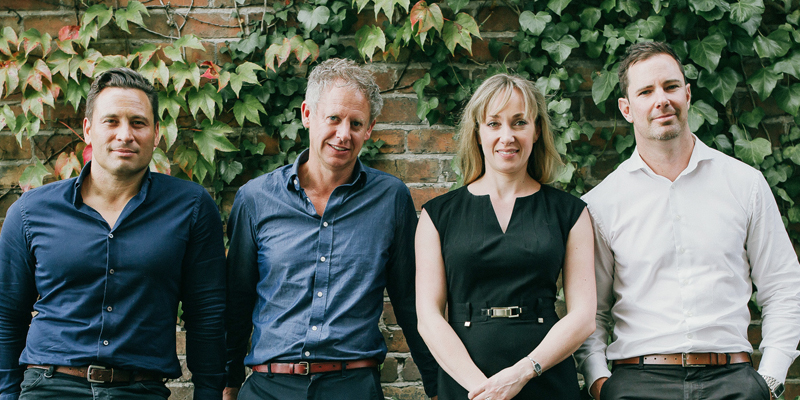The fintech devotee
You’ll be hard pressed to find anyone more devoted to the fintech start-up sector than Kristen Lunman, or more passionate about disrupting the status quo. The co-founder of digital investment […]
You’ll be hard pressed to find anyone more devoted to the fintech start-up sector than Kristen Lunman, or more passionate about disrupting the status quo. The co-founder of digital investment platform Hatch shares her story to help other fintech beginners.
It’s not difficult to see why Kristen Lunman was nominated for the New Zealand Women of Influence Innovator of the Year awards in 2018. For a number of years Kristen has been a leading fintech start-up advocate. She has worked as a senior strategy professional both here and overseas, and her reputation in the start-up ecosystem includes time spent scaling Wipster in the global arena and directing Kiwibank’s Fintech Accelerator – where she encouraged and championed Kiwi start-ups on the international stage.
Then in 2017 Kristen found herself on the receiving end of an incubator programme when she pursued the idea of challenging the status quo and opening up the US sharemarket to all Kiwi investors. Launched in September 2018, Hatch is a “game-changing” self-directed digital investing platform. It’s a “one-stop shop for wealth”; a unique platform that “democratises investment and wealth” – giving investors easy access to the largest and most liquid sharemarket in the world and familiar brands such as Tesla, Facebook, Apple, Nike, Netflix, Amazon and Google.
Investors have access to more than 2900 of the world’s best-known companies; more than 500 exchange-traded funds; and fractional investment options which allow them to buy portions of companies and diversify their portfolios.
“Further iterations will add additional products onto the platform,” says Kristen.
Hatch was pitched to, and invested in, by Kiwi Wealth (a sister company to Kiwibank) after the CEO of Kiwi Wealth had seen the need to innovate in the emerging “platform economy”.
After ten months as co-founder and GM, Kristen has overseen the company to $30 million in investments, with month-on-month growth averaging 20 percent – that’s a source of great personal pride.
Anybody involved in New Zealand’s fintech start-up sector will know how tough a market it is. The sector is highly regulated, distribution channels are controlled by incumbent corporates and there’s little desire for change. But as director of the Kiwibank Fintech Accelerator, Kristen saw the chance to build a community by bringing all parties together, where they quickly recognised that their success and survival were intertwined.
For Wellington-based Kristen, Hatch is just the latest stop on a remarkable and busy life journey. Canadian by birth, and to Kiwi parents, Kristen has always held a passion for growing small businesses, where she believes she can deliver a measurable impact. Her mother is a highly successful potter and her father a geologist who has owned businesses around the world. They were passionate adventurers and explorers, she recalls. “So I was constantly encouraged to work hard, get out of my comfort zone, and view the world differently.”
Kristen gained some training in governance and project management, but her pivotal “start-up MBA” was the aforementioned Wipster – described as “Google Docs for videos”. It was her first tech start-up.
She had dabbled in the digital space in Canada while having children, but here in New Zealand her three to four years with Wipster would prove to be the most intense period of her life.
“We were throwing everything against the wall to see what would stick,” she remembers. “It truly was a daily grind.”
During that time Kristen learned a lot – particularly on how to “fail fast” – and she managed to turn an all-male staff into a highly successful 50/50 gender split. Coming from a long line of feminists who admire women who break glass ceilings – that’s a particular achievement she relished.
The whole Wipster experience set Kristen up nicely for her role with the Kiwibank Fintech Accelerator three years ago, where she was able to bring key people together all in one place – sponsors, partners, mentors, investors and start-ups. It taught her how diversity of thought can hugely impact the success of a fledgling business. Even those businesses that don’t work still come away with valuable knowledge and connections.
Today gender diversity remains on her priority list and she continues to mentor women through the Accelerator, as well as the Mahuki Innovation Incubator, Lightning Lab XX and Female Founder Accelerator.
Kristen believes there have been major strides in gender diversity, particularly in the fintech sector. One more generation should see it eliminated altogether, she believes, along with discrimination towards age, ethnicity and other minorities.
If all that mentoring doesn’t keep her busy enough outside her family commitments, Kristen is an advisor to a number of early-stage businesses.
Kristen’s lessons
Kristen has identified a number of common factors that determine the success of a start-up. It’s about the quality of your team, the size of the problem you’re solving, researching your customers’ needs, as well as execution, timing and luck. And if things don’t work out initially, rebirth can be just a pivot away.
A business needs a “backbone” too, explains Kristen. “Clearly communicate your vision for the business and where it’s going. What is its purpose? Why are your people turning up – why should they care? Why do you care? And what are its cultural values and behaviours? Those are what you’ll be firing, hiring and rewarding by,” she says. “Get that right and it will lead you to exceptional people. People who are experts at their craft and can provide accountability.”
Tech start-ups are still quite nascent in New Zealand, she says, and somewhat surprisingly, 40 is the average age of a successful tech entrepreneur. This is probably due to all the failures that ultimately lead to the big successes, she explains.
As for advice for start-up entrepreneurs, Kristen believes it’s incredibly important to be humble and to surround yourself with exceptional people. “People who are better than you at their given craft.”
It doesn’t matter how well qualified you are, it pays to leave your ego at the door, she says. “When you get into a small business, you’re truly nothing. You’ll be doing everything from paying bills to negotiating partnerships. No job is too small or too big.
“You also have to learn to move the needle every day – there has to be a measurable value-add, and many entrepreneurs thrive on that.”
Resist outsourcing in the early days, she says, unless there’s a very particular skillset you need. “Nobody understands your business like you do, or as passionately as you do.”
At the same time, understand that you may not have the ability to take your start-up to the next stage either. “That’s a mature thing to do, and a tough decision to make,” says Kristen.
Above all, remember that innovation requires diversity of thought, she adds, in order to successfully compete.
“I’m really hopeful with what I’m seeing in the ecosystem now.”
The power of fintech
Research into the financial sector prior to Hatch revealed the extent of the traditional incumbents’ power and their lack of customer-centricity. Kristen says fintechs are now starting to take the power away from those big corporations and putting it back into the hands of the customer, where it belongs. “These new transparent businesses place the customer back at the centre and exchange appropriate fees for value. There’s no fine print.”
Disruption starts slowly, and then happens abruptly, she points out.
In the case of Hatch, Kristen says the start-up is hitting its milestones and its targets.
Its biggest challenge today is still creating awareness. People are busy and many are apathetic when it comes to their finances, she says. “You have about three seconds to grab someone’s attention.”
Hatch’s biggest competition is therefore just people doing nothing. It’s not easy to get people to care about their long-term investments.
Another challenge for Hatch has been finding suitable team members. “There have been a few missteps,” admits Kristen, “but that’s not uncommon. Forming the right team is so critical.”
And, of course, operating in the fintech space means there are compliance challenges.
Innovating and pushing boundaries in the fintech sector within the law can require you to walk a tightrope, she says.
Staying sane
With her numerous mentoring commitments and business interests, getting through a typical workday can be a fine balancing exercise for Kristen – but she says the key is to always have a flexible workspace. “I build my work around my life, not the other way round,” she explains.
If it means she can attend all the defining moments of her children’s lives, in both school and sport, and go running or attend yoga classes with friends to stay healthy – then she’s happy to work those extra few hours at night.
“I’m not saying I’ve got it right – life’s always a compromise when growing a business. But flexible working has kept me sane, and involved in my kids’ lives, which is very important to me.”
Looking ahead, Kristen’s goals straddle home and business – mastering the art of surfing with her daughter in Australia; continuing to engage with Hatch’s customer base and solve more investor problems with new products. And all with the love and support of her “biggest fan”, her husband Kyle – who happens to be a risk manager at one of New Zealand’s major banks.
Considering the nature of their respective roles and personalities – Kristen agrees that it’s a classic case of “opposites attract”.



